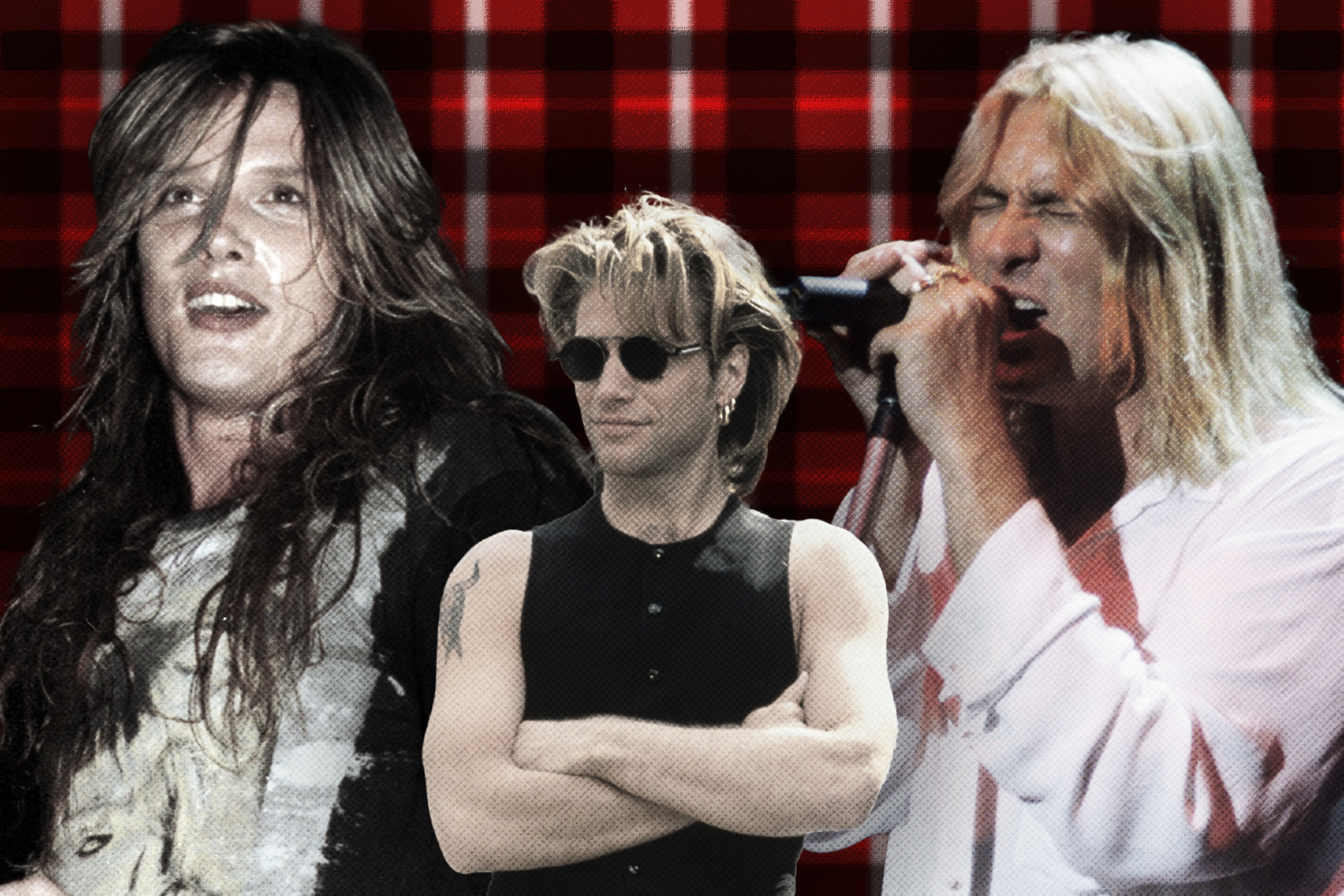 For the first wave of grunge superstars, 1991 was “the year punk broke.” For many of the rock bands that were already popular in 1991, it was the year punk broke them.
For the first wave of grunge superstars, 1991 was “the year punk broke.” For many of the rock bands that were already popular in 1991, it was the year punk broke them.
But grunge and punk didn’t overtake the Aqua Netted power ballads that dominated late-Eighties and early-Nineties MTV overnight.The week that Nirvana’s Nevermind came out, the record didn’t even crack the Billboard 200; Guns N’ Roses, Metallica, and Ozzy Osbourne dominated the Top 10 , while the rest of the list’s rock offerings included Extreme, Skid Row , and the last vestiges of hair metal.A year later, though, Alice in Chains and Pearl Jam had become Top 10 artists , and LPs by Nirvana, Mother Love Bone, and Soundgarden (all of which rank highly on Rolling Stone’s 50 Greatest Grunge Albums list) populated the rest of the chart.A few glam-metal offerings still glimmered, but largely, the sea change of grunge had started to redefine mainstream rock.
Related Stories Geddy Lee’s Upcoming Memoir Helped Him Cope With Neil Peart’s Death Kiss Announce Massive ‘Destroyer’ 45th Anniversary Reissue With Unreleased Demos, 1976 Concert Related Stories The Best Audiophile Turntables for Your Home Audio System The 100 Greatest Music Videos
“Basically [grunge] put me out of business, scared the crap out of me,” Twisted Sister’s Jay Jay French recently reflected .“I just said, ‘Why are we even here?’”
But not every rocker felt so outmoded, as artists from all genres started changing their looks and sounds to fit the moment.By the mid-Nineties, the once–orange-coiffed David Bowie adopted black eyeliner and T-shirts, Metallica cut their hair and bared their souls on brooding songs like “Until It Sleeps,” and even Garth Brooks traded his 10-gallon hat for a dyed-black bowl cut and quixotically started calling himself Chris Gaines.As for the spandex-clad, teased-hair cock-rockers whose lovey-dovey ballads and party anthems had suddenly become self-parody, they either gave up like Jay Jay French or retrofitted themselves with ragged guitar riffs, self-immolating lyrics, and sore-throat vocals.
Some of them adapted well, crafting brilliant grunge forgeries, and the rest … oh well, whatever, nevermind.Here are 10 songs by bands who overhauled their sounds in the wake of Nirvana, and how those efforts fared.
Mötley Crüe, “Misunderstood” (1994)
When Mötley Crüe returned in 1994 with their self-titled LP, five years had passed since their prior album Dr.Feelgood .
But considering all the musical changes that had taken place since grunge hit in 1991, the lag may as well have been five decades.Complicating things even more, the band had parted ways with vocalist Vince Neil in the interim and hired John Corabi to replace him.
As you can tell from the video for “Misunderstood,” they felt they could get through the alternative-rock revolution by ripping off Alice in Chains, jamming on a porch like “Girls, Girls, Girls” didn’t happen, and showing sad, black-and-white images of elderly people, including a veteran who sticks a gun in his mouth.The maneuver managed to alienate many OG Crue fans while failing to attract anyone new.
As Corabi says in the song, “Life’s not always fair.”
Extreme, “Hip Today” (1995)
A band built around the odd fusion of of funk-metal and Air Supply vocal harmonies, Extreme catapulted into the Top 10 in 1991 with the soppy “More Than Words” and acoustic stomp-rocker “Hole Hearted.” Even after Nevermind , they managed a Number One mainstream rock hit in ’92 with the funky “Rest in Peace” but seemed to undergo a crisis of faith by 1995’s Waiting for the Punchline , which featured a grungy album cover (a frowning clown in a sepia-toned industrial wasteland) and the single “Hip Today.” On the song, six-string whiz kid Nuno Bettencourt restrained himself with simpler guitar riffs (but still shredded ecstatically on the solo), while frontman Gary Cherone adopted a Scott Weiland–esque howl to match his freshly shorn haircut.The album peaked at Number 40, and the band broke up the next year when Cherone decamped for Van Halen, later re-forming in the mid-2000s.
Alice Cooper , “Unholy War” (1994)
In the first two decades of his career, Alice Cooper seamlessly transitioned from glitter rock to arena rock, New Wave, and even hair metal.But despite a nice boost from an appearance in the Wayne’s World movie, things got a little tricky for him in the grunge era.It wasn’t for lack of trying.In 1994, he recruited Chris Cornell, then at the peak of his Soundgarden fame, to write a couple of songs (“Unholy War” and “Stolen Prayer”) for his concept record The Last Temptation.Had Soundgarden recorded “Unholy War” on Superunknown, it might have made an impact.But there was simply no market for a creepy, middle-aged grunge dude, and the song and album disappeared without a trace.
Def Leppard , “All I Want Is Everything” (1996)
Def Leppard ditched longtime producer Mutt Lange for their 1996 Slang LP in an attempt to craft a more modern sound and compete with the grunge bands of the era.
Single “All I Want Is Everything” is a mournful song that’s packed with regret (“All I have is yesterdays/Tomorrow never comes”), and the video of a pale, shirtless man wandering around waterfalls and cityscapes in a confused state of agony is certainly the direct opposite of anything from their “Pour Some Sugar on Me” days,” but a downbeat, mopey Def Leppard isn’t really playing to the band’s strengths.They returned to their signature sound (with a little help from Lange) on their follow-up album Euphoria in 1999, and they never looked back.
Kiss , “Jungle” (1997)
Kiss went disco with “I Was Made For Loving You” in 1979 and they went hair metal with “Heaven’s on Fire” in 1984, so it’s not even remotely shocking that they decided to try their hand at grunge in “Jungle,” a track from their Carnival of Souls LP.Written by Paul Stanley, Bruce Kulick, and Curtis Cuomo, the song sounds like a bizarre jam between Collective Soul and Alice in Chains.
Maybe this could have helped Kiss connect with the MTV crowd in the mid-Nineties, but they decided to shelve Carnival of Souls in 1996 and instead reunite the original band, put the makeup back on, and make a fortune on the nostalgia circuit.When the album finally came out in 1997, it was greeted as little more than a curiosity.To a small segment of hardcore Kiss fans, however, it’s a lost classic.
Bon Jovi , “Hey God” (1995)
Tommy and Gina may have been going through some hard times in “Living on a Prayer,” but their plight was nothing compared to the desperate people we meet in Bon Jovi’s 1993 song “Hey God.” One is a working-class single mother whose son was arrested for killing a cop (“She did her best to raise him/But the world got in the way”) and another is an inner-city youth who picks up a gun at age 12 (“The odds are against him/Junior don’t make 21”).This is some bleak stuff, and it’s paired with grungy guitars courtesy of Richie Sambora.
The song made almost no impression in America, but it was a minor hit across parts of Europe, and Bon Jovi have played it live as recently as 2013.
Skid Row, “Into Another” (1995)
The New Jersey hard-rockers’ third album — and last with singer Sebastian Bach — didn’t make a shameless pivot into Seattle sounds like other records of the era.In fact, listening to it today, it sounds like a natural, if sludgier, evolution from 1991’s intense Slave to the Grind .But “Into Another,” Subhuman Race ’s final single, had all the grunge hallmarks: Rachel Bolan’s snaking, ominous bass line; a thick, chunky riff from Scotti Hill; and plodding, hollow drums.Even the music video, with its creepy characters walking tightropes and emptying bags of sand, looked like a Nirvana or Tool outtake.
Credit Bach’s melodic, operatic vocal for keeping “Into Another” from getting too (man-in-the) boxed-in: Even as his genre was about to be lost to the winds of change, he couldn’t resist showing off those pipes.
Ugly Kid Joe, “Tomorrow’s World” (1995)
“Are you the guys on the beach who hate everything?” asks SNL cast member Julia Sweeney in character as Pat in a tacked-on intro to Ugly Kid Joe’s breakthrough single, “Everything About You.” The tune was a novelty hit in ’91 thanks to the video in which frontman Whitfield Crane, yes, stood on a beach and listed everything he hated (notably, “everything about you,” and, unbelievably, sex) over cock-rock riffery.A few years later, they scored an improbable hit with a cover of Harry Chapin’s daddy-never-loved-me lament “Cat’s in the Cradle,” which Crane crooned through gritted teeth in a way that sounded fashionable enough to follow Alice in Chains’ “Rooster” video on MTV.But the band didn’t go full grunge until “Tomorrow’s World,” off their 1995 album Menace to Sobriety .The mushy bass sounds, tribal drums, and echoey guitar came straight from a Soundgarden fakebook, while Crane attempted to howl like Layne Staley.
It didn’t take, and after another album ( Motel California ), the band split in 1997 and re-formed well after the coast cleared in 2010.
Rush , “Stick It Out” (1993)
In embracing a darker, more stripped-down sound on 1993’s Counterparts, Rush weren’t so much aping prevailing trends as getting back to basics, specifically the snarling power-trio sound they’d favored on early classics like 2112, before they’d taken a synth-poppy turn in the Eighties.“When Alex [Lifeson] and I started writing this record, we kind of looked at these mountains of synthesizers that were being brought into the writing room, and we kinda had this reaction; it was almost like an allergic reaction: ‘I think it’s time maybe we stepped back from this stuff,’ ” Geddy Lee said at the time .Director Samuel Bayer matched the burly, driving riffs of lead single “Stick It Out” with a video that checked all the alt-rock boxes: moody red-and-blue lighting, spooky strobe effects, and inexplicable scenes of a tied-up man struggling to free himself from a chair.Dated-on-arrival visuals aside, the song didn’t come off as a shameless plea for legitimacy, simply because Rush had mined similar musical territory years earlier — and could still pull it off convincingly as of ’93.
DC Talk, “Jesus Freak” (1995)
Originally a Christian hip-hop trio, DC Talk attracted disciples with verses like “I got a reason to rap, ’cause my god is king” on “Spinnin’ Round,” and, “My god is doing a brand-new thing but since time began, He remains the same” on “Nu Thang.” And they were incredibly successful, earning gold and platinum plaques, by virtue of being the Only Rap Group Mom Will Let Me Listen To.But they never sold so many records as when they became the Only Grunge Band Mom Will Let Me Listen To on their 1995 album, Jesus Freak .“Does it make me a stranger that my best friend was born in a manger?” they ponder before a Jerry Cantrell–like guitar solo on the title track.
The combination of cutting guitars, personal lyrics about religious identity crises, and, naturally, a dash of holy hip-hop turned out to be a divine formula: the album went double platinum..
